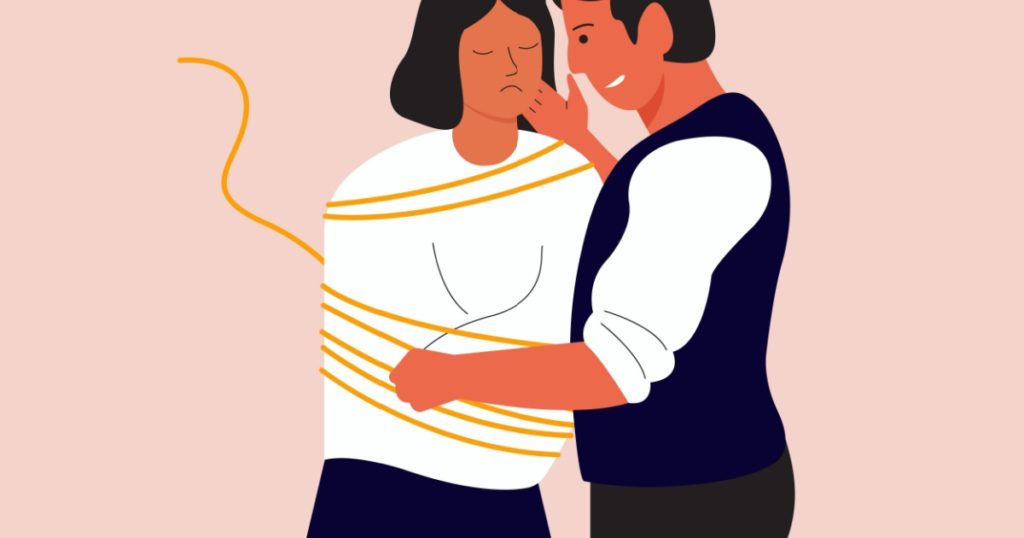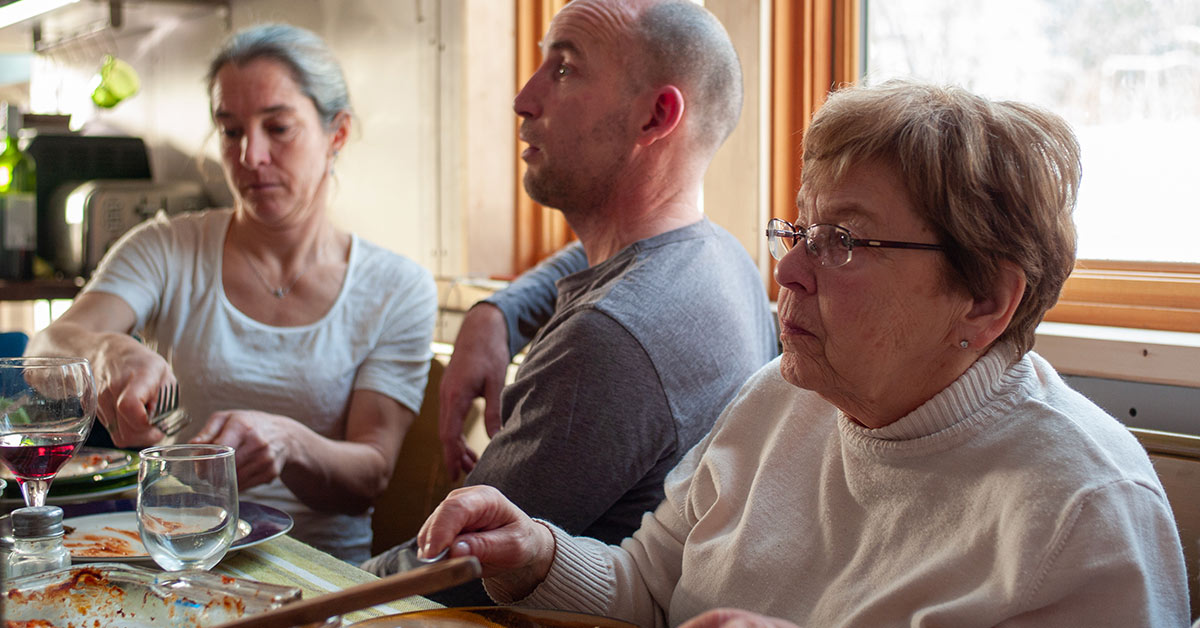The word family is a loaded one. For some, it’s loaded with positivity. For most, it’s probably a bit of a mixed bag. There are many people, however, for whom family brings up a lot of negative emotion. The thing is, as much as we like to romanticize the idea of family, the reality is that these people can be just as toxic as anyone else. In fact, in many cases, they can be even more so. Sometimes cutting ties with your family is the only option you have. This is how to know you’ve got a toxic family member, how to know when to cut them out of your life, and how to do it.
Cutting Ties With Your Family Is Not Bad

Cutting toxic people out of our lives is not easy, no matter who it is. This becomes particularly complicated, however, when it is our own family members. There is often a lot of pressure and expectation regarding family members. Many of us are taught from day one that familial relationships are the most important and that they should come before all else. (1) We’re taught that these people are supposed to love us and be there for us. You fight for your parents’ love and approval or take verbal abuse from extended family members for years, all the while being taught that you are the problem. (2)
Read More: Shaq Stunned Family With Generosity After Buying Them Two New Cars
This is what makes cutting ties with your family so challenging

You want to have the loving family, happy family you see depicted on TV. Chances are you feel extreme guilt about even considering it, or you have a sense of obligation despite the mental and emotional abuse you’ve endured. Moreover, there’s a good chance you still do love your family despite it all. (2) Before we go any further, let’s get one thing straight: just because they are related to you doesn’t mean they deserve an automatic spot in your life. Sure, they were given one when you were born, but you are an adult now. You get to decide who sits front, middle, back, and who gets banned from the arena for life. Sharing DNA has nothing to do with it – it’s all about how people treat you.
How To Spot A Toxic Family Member

Even still, you might be unsure as to whether these family issues can be worked on or whether there’s nothing left to be done. After all, just because a relationship isn’t perfect doesn’t mean it’s toxic. So how do you pick out a toxic family member versus one that maybe you just don’t jive with?
According to PsychCentral, any of the following could be a sign (2):

- Lying
- Blaming
- Criticizing
- Manipulating
- Overreacting
- Invalidating or ignoring your feelings
- Undermining your relationship with your spouse, kids, or other relatives
- Creating drama or crises
- Passive-aggressive behavior (such as the silent treatment, deliberate procrastination, or criticism disguised as a compliment)
- Gaslighting (a powerful form of manipulation that makes you doubt your perception of what’s going on)
- Refusing to compromise
- Yelling, cursing, or calling you names
- Belittling your values, beliefs, choices
- Gossiping or speaking ill of you behind your back
- Making unreasonable demands
- Expecting you to help them, but they aren’t available to help you
- Threatening suicide or self-harm to get their way
- Ruining holidays and special occasions
- Playing the victim
- Not taking responsibility for their own behavior
- Refusing to apologize, and if they do, it’s shallow, coerced, or fake.
- Lacking genuine concern or interest in you and your life
- Volatile or unpredictable moods and behaviors
- Creating so much stress, anxiety, and pain that your health, ability to work, or general wellbeing are negatively impacted
- Interacting with them makes you feel worse.
- They are always right (and you are always wrong)
Read More: Family of boy, 5, sought medical help three times before Strep A death
Were any of these situations a regular part of your childhood?

Here are 5 signs that you may recognise:
1. You were expected to meet unrealistic standards and you could never live up to them.

This could come in a variety of packages. Perhaps no matter how hard you worked and how well you did in school or your extracurriculars, it was never enough. (3) At home, you may have been expected to (3) parent or discipline younger siblings or provide most of their care, having to take on responsibilities like cooking meals or doing certain heavy chores before you could safely or capably do so, or provide emotional support as if you were a partner or other adult.
2. They criticized you harshly

It’s part of a parent’s job to be somewhat critical of their children sometimes – sometimes being the keyword. Moreover, when these occasions (aka occasionally, not all the time) do arise, it should be done constructively and focus on your behavior, not a personal attack on you. A child should never be made to feel unloved, unwanted, or inferior. (3)
3. Your needs were not met

This goes beyond just your basic needs of food, water, and a warm bed. This also means proper boundaries and discipline, affection, making sure you had an education and clean clothes to wear, and your health and well being were taken care of. (3) On the flip side, it could also mean that you had overbearing parents rather than neglectful ones. All children need physical, mental, and emotional personal space to learn and grow. Parents who don’t allow their children to have that space stunt their ability to develop confidence and independence. (3)
Read More: Passenger Applauded for Refusing to Swap Seats So Family Could Sit Together
4. You feel controlled, but not loved or respected

Yes, your family wants the best for you, but they should continue to support you and be there for you always. They should not, however, control your life, including major aspects like relationships and careers. Moreover, their love and respect should not hinge on whether you follow their advice or opinions. (3) If your family member mocks or belittles your choices, attack your vulnerabilities, or lowers your self-esteem, this is not okay. They may not always agree with you, but they should never make you feel stupid or unlovable because of that. (3)
5. You experience emotional, verbal, or physical abuse

- inappropriate touching
- sexual gestures or innuendo
- sexual comments about your body
- name-calling
- sexual abuse
- harsh or extreme criticism
- Gaslighting
Finally, if this behavior is chronic

This is a problem. Sometimes things happen in people’s lives that cause them to act out, and often it’s those closest to them who bear the brunt of it. If it happens all the time, however, this is toxic. Keep in mind substance abuse: If the person in question heavily uses alcohol or other substances and this is often what causes them to be abusive in the first place. Until they get that habit under control, this won’t change. Also, remember that it is not your job to fix them; you have done enough. (3)
Read More: Family is sharing their story of tragic loss to raise awareness about allergies
How To Start Cutting Ties With A Family Member

Chances are if you think that maybe you need to put an end to a relationship with a family member or members, it’s because it is long overdue. Though this is incredibly difficult, the relief and sense of freedom you will feel without their dark cloud hanging over you will be well worth it. (4) When cutting ties with your family, you must first acknowledge that what they did was abuse. Stop making excuses for them, and stop minimizing the harm they have caused you. It would help if you also let go of the dream that they will change because they won’t. The longer you hold onto that fantasy, the more you will prolong your own suffering. (2)
Next, allow yourself time to grieve. You are grieving the loss of a relationship that you wanted, needed, and deserved but never got. Give yourself space and time to do that. (2) Seek out professional help or a support group. You can also use friends for support; however, remember that you are not just requiring help with breaking off that toxic relationship. You also must work through years of emotional and mental abuse and neglect. This is a job truthfully done best with a professional who can guide you through that journey. (2)
What To Do in Family Situations

If you’re cutting ties with your entire family, avoiding them might not be as challenging. However, if it’s only one or two members, you might still have to see them occasionally on some holidays or family events. (3) A therapist can help you develop a plan as to how you will handle these situations. However, you can start building one on your own, as well.
This plan can include:

- Deciding beforehand what topics you want to avoid
- Brainstorming ways to change the subject
- Answering a provoking or prying question with another question
- Letting family members know you don’t want to discuss certain topics
The Bottom Line

The important thing is to set boundaries for yourself. Know what you will and won’t entertain, what types of behaviors you won’t accept, and when you will draw the line and leave. (3) Also, recognize that you might be reading this knowing that you aren’t ready to completely cut anyone off. This is perfectly normal and allowed. Many of these suggestions, such as hiring a therapist, making a plan, and setting boundaries, are excellent ideas. These will help you handle the situation you are currently in. If or when you decide it is finally time to cut ties with your family or family member, you will be more equipped and prepared to do so.
Read More: A True Father Is Not the One Who Pays the Bills, but the One Who Puts His Family First
Sources
- “8 Reasons We May Need to Cut Ties With Family Members to Be Healthy.” Huff Post. Sherrie Campbell, PhD. November 24, 2014.
- “Its Okay to Cut Ties with Toxic Family Members” Psych Central. Sharon Martin, LCSW. October 18, 2019.
- ” How to respond to it. Healthline. Crystal Raypole. October 25, 2019.
- “How to Know When to End a Relationship With Family.” Very Well Family. Carly Snyder, MD. March 4, 2020.

